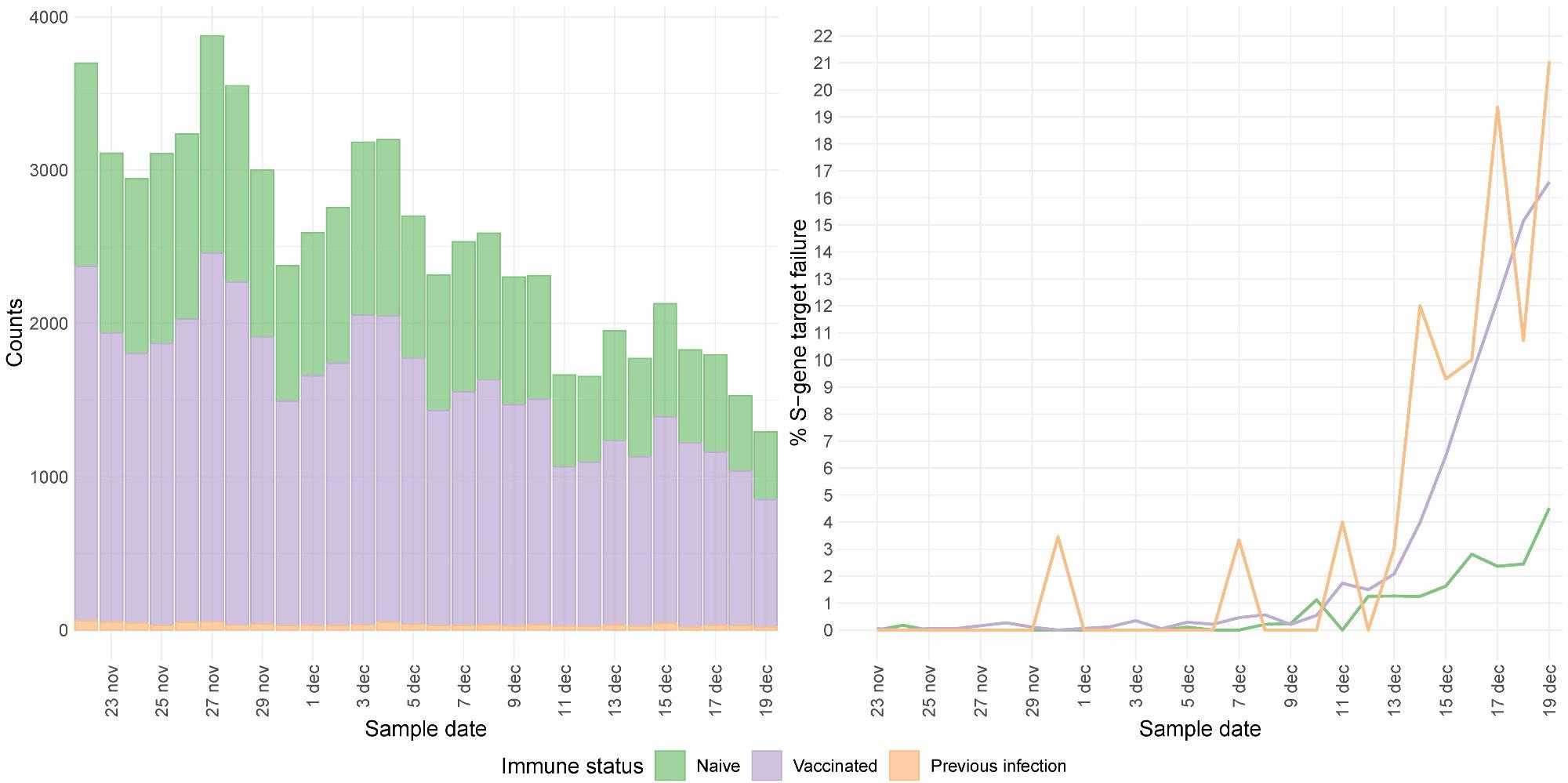In a recent study posted to the medRxiv* preprint server, researchers investigated the distribution of severe acute respiratory syndrome coronavirus 2 (SARS-CoV-2) Delta and Omicron variants among coronavirus disease 2019 (COVID-19) positive individuals who were either naive, fully vaccinated, or had a previous infection to further investigate possible escape from vaccine- or infection-induced immunity by Omicron compared to Delta.
 Study: Increased risk of infection with SARS-CoV-2 Omicron compared to Delta in vaccinated and previously infected individuals, the Netherlands, 22 November to 19 December 2021. Image Credit: Naeblys / Shutterstock
Study: Increased risk of infection with SARS-CoV-2 Omicron compared to Delta in vaccinated and previously infected individuals, the Netherlands, 22 November to 19 December 2021. Image Credit: Naeblys / Shutterstock

 This news article was a review of a preliminary scientific report that had not undergone peer-review at the time of publication. Since its initial publication, the scientific report has now been peer reviewed and accepted for publication in a Scientific Journal. Links to the preliminary and peer-reviewed reports are available in the Sources section at the bottom of this article. View Sources
This news article was a review of a preliminary scientific report that had not undergone peer-review at the time of publication. Since its initial publication, the scientific report has now been peer reviewed and accepted for publication in a Scientific Journal. Links to the preliminary and peer-reviewed reports are available in the Sources section at the bottom of this article. View Sources
The SARS-CoV-2 Omicron variant has been rapidly spreading worldwide. The variant displayed an unprecedented number of mutations in the Spike protein, including around 30 amino acid substitutions, three deletions, and one insertion. The deletion of amino acid at positions 69 and 70 of the spike protein (Δ69–70) has been associated with failure of the probe targeting the S-gene, while the Orf1ab and N probe result in a proper signal (S-gene target failure (SGTF), also referred to as S-drop-out). This failure to detect the S-gene target in an otherwise positive PCR test has proven to be a highly specific proxy for the Alpha variant in the past and the Omicron variant presently in the context of sporadic circulation of other Δ69–70 variants. These modifications in the Spike protein and failure of the probe targeting the S-gene raise concerns about the protection induced by current SARS-CoV-2 vaccines against the Omicron variant.
About the study
In this study, researchers used data from two large diagnostic laboratories analyzing specimens from national community testing in the Netherlands that used the TaqPath COVID-19 RT-PCR Kit. It was noted that with lower viral loads, the S-gene target tends to be the least sensitive of the three targets in the Taqpath system, which could result in an incorrect allocation of an SGTF.
SGTF was identified using an astringent threshold to avoid an erroneous diagnosis of Omicron infections. In-house titration displayed decreased sensitivity for the S-gene target in viral loads that give a cycle threshold (Ct) value of around 32 for the ORF1ab and N targets. Hence, the results with a Ct value of ≤ 30 for both targets were included for further analyses. The results obtained from S-gene testing were linked to vaccination status data which includes all positive SARS-CoV-2 cases in the Netherlands.

Persons were defined as fully vaccinated when they received two doses of Comirnaty (BNT162b2, BioNTech/Pfizer), Spikevax (mRNA-1273, Moderna) or Vaxzevria (ChAdOx1, AstraZeneca)more than 14 days before the symptom onset date or one dose of Janssen vaccine more than 28 days before the symptom onset date. In case of unknown vaccination status, researchers used self-reported vaccination status. In this study, fully vaccinated individuals received two doses more than 14 days before the symptom onset date or one dose of the Janssen vaccine more than 28 days before the symptom onset date. Two days before the sample date was used for cases without an onset date. Unvaccinated individuals did not receive any vaccine. Individuals with the previous infection included those having positive PCR or antigen test results at least eight weeks before the current positive test based on the notification and testing register.
Children under 12 years of age were excluded since they were not yet eligible for vaccination in the study period. Among infected individuals, the researchers compared the percentage of SGTF between unvaccinated cases without a known previous infection (naïve), fully vaccinated cases without a known previous infection, unvaccinated cases with known previous infection. Furthermore, logistic regression was performed to estimate the association between immune status and SGTF, adjusting for the testing date, 10-year age group, and sex. An additional analysis was performed, where cases with a history of travel outside the Netherlands 14 days before symptom onset were excluded.
“Our results suggest a large reduction in protection against SARS-CoV-2 infection with the Omicron variant compared to the Delta variant after full vaccination.”
Results and conclusions
The study results suggested a considerable reduction in protection against SARS-CoV-2 infection with the Omicron variant compared to the Delta variant after full vaccination. These results were consistent with in vitro studies that showed a 30-40-fold reduction in the neutralization of the Omicron variant with convalescent sera or sera of fully vaccinated individuals. In addition, the data showed an odds ratio (OR) of around 5, suggesting a significant reduction in vaccine effectiveness.
The findings showed that individuals with a previous infection also have a clear increased risk of infection with Omicron compared with naïve individuals, suggesting that prior infection with another SARS-CoV-2 variant provides low levels of protection against Omicron infection. In the case of reinfections, a shorter period was observed between the two episodes for Omicron cases compared to Delta. The study did not include the effect of booster vaccination, as booster vaccination started only recently in the Netherlands.
In conclusion, the results suggest a substantial decrease in protection from vaccine- or infection-induced immunity against SARS-CoV-2 infections caused by the Omicron variant compared to the Delta variant. This highlights the urgent need for a booster vaccination and the significance of non-pharmaceutical interventions to prevent SARS-CoV-2 transmission.

 This news article was a review of a preliminary scientific report that had not undergone peer-review at the time of publication. Since its initial publication, the scientific report has now been peer reviewed and accepted for publication in a Scientific Journal. Links to the preliminary and peer-reviewed reports are available in the Sources section at the bottom of this article. View Sources
This news article was a review of a preliminary scientific report that had not undergone peer-review at the time of publication. Since its initial publication, the scientific report has now been peer reviewed and accepted for publication in a Scientific Journal. Links to the preliminary and peer-reviewed reports are available in the Sources section at the bottom of this article. View Sources
Journal references:
- Preliminary scientific report.
Increased risk of infection with SARS-CoV-2 Omicron compared to Delta in vaccinated and previously infected individuals, the Netherlands, 22 November to 19 December 2021. Dirk Eggink, Stijn P. Andeweg, Harry Vennema, Noortje van Maarseveen, Klaas Vermaas, Boris Vlaemynck, Raf Schepers, Arianne B. van Gageldonk-Lafeber, Susan van den Hof, Chantal B.E.M. Reusken, Mirjam J. Knol, medRxiv, 2021, DOI: https://doi.org/10.1101/2021.12.20.21268121, https://www.medrxiv.org/content/10.1101/2021.12.20.21268121v1
- Peer reviewed and published scientific report.
Eggink, Dirk, Stijn P Andeweg, Harry Vennema, Noortje van Maarseveen, Klaas Vermaas, Boris Vlaemynck, Raf Schepers, et al. 2022. “Increased Risk of Infection with SARS-CoV-2 Omicron BA.1 Compared with Delta in Vaccinated and Previously Infected Individuals, the Netherlands, 22 November 2021 to 19 January 2022.” Eurosurveillance 27 (4). https://doi.org/10.2807/1560-7917.es.2022.27.4.2101196. https://www.eurosurveillance.org/content/10.2807/1560-7917.ES.2022.27.4.2101196.